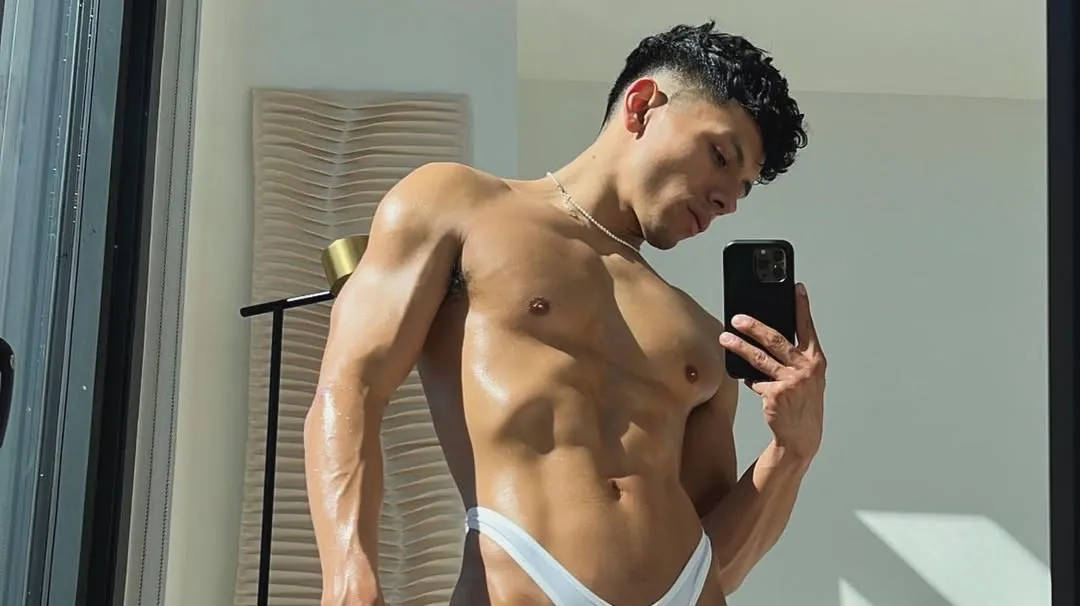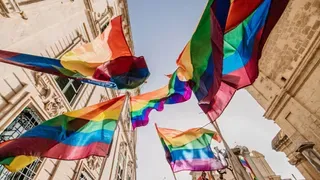October 6, 2008
How Pat Buchanan Energized Rachel Maddow
Steve Weinstein READ TIME: 4 MIN.
At 19, Rachel Maddow shared a house with friends in Philadelphia and wasn't paying much attention to the 1992 Republican National Convention on television until Pat Buchanan took to the podium.
She was transfixed. Buchanan's combative conservative speech, which denounced gay rights, was a milestone for people on two sides of a political divide. Either a call to arms or intolerant, depending on your point of view, it couldn't be ignored.
"Pat's culture war speech at the Republican convention hit me right between the eyes," said Maddow, MSNBC's new star and a lesbian. "He was, without euphemism, declaring that my own country was at war with me. I get it intellectually and strategically now, but at 19, I only got it emotionally."
So there's a certain irony that Maddow and Buchanan have a prime-time date many nights now on television.
"It's Pat" is a semi-regular feature on "The Rachel Maddow Show," a program that has surprised even the people who put it on with its success after only a month on the air.
Maddow is a regular on the liberal "Air America" radio network and had appeared frequently on MSNBC, particular on Keith Olbermann's "Countdown." She was given the 9 p.m. EST slot when network executives judged Dan Abrams' show a failure.
Its second week on the air, Maddow's audience was bigger than CNN's "Larry King Live." King won the third week and the two are settling into what promises to be a competitive battle behind Fox News Channel's dominant "Hannity & Colmes." During the week of Sept. 22, Fox's show averaged 3.2 million, CNN had 2.1 million and Maddow was at 1.7 million.
She has more than doubled the audience that MSNBC had been getting in the time slot, according to Nielsen Media Research, and is keeping much of the audience that watches Olbermann.
Naysayers told MSNBC chief executive Phil Griffin that Maddow would be too much like Olbermann, and there was a risk in turning his prime-time lineup completely over to one political point of view.
Instead, Maddow is something of a happy warrior compared to Olbermann's increasingly dark prince. The Rhodes Scholar can lap almost anyone intellectually without making you hate her for doing it.
"She's likeable," Griffin said. "She smiles, she has fun. She's interesting."
If Olbermann's show has a drumbeat that drives it, Maddow's "got a little bit of a symphony," he said.
She also doesn't back down from a fight. Olbermann's "Countdown" is well-written and meticulous, but he relies on guests who rarely disagree with him.
Maddow frequently brings on guests to argue with her, none more so than Buchanan.
He can exasperate her, and vice versa. To date, it hasn't become nasty.
To a certain extent, Maddow credits Buchanan with giving her television career a push. A few years ago when Buchanan hosted a show at MSNBC, he remembered her and sought her out for work.
"I like debating things with Pat," Maddow said. "He's funny and quick and intellectually coherent, even when his views are totally toxic."
Thinking back to the culture war speech, Maddow sees how one of Buchanan's contribution to Nixon-era politics was the idea of "positive polarization," or dividing the country against itself and siding politically with the bigger half.
Buchanan, by e-mail, said that "Rachel and I get along fine," but didn't elaborate since he prefers not to participate in feature stories about MSNBC shows. He's a paid MSNBC contributor, but the cable network has become particularly noxious to Republicans, mostly because of Olbermann.
Griffin said he liked how Maddow and Buchanan played off each other during MSNBC's primary coverage in the spring. "They're 180 degrees apart but they like each other," he said.
Maddow is still juggling several ideas around, even with the fast start.
"Every segment, every minute of the show is still a work in progress," she said. "We're still trying to figure out what works best on air, what we're capable of producing well, what's fun. I expect that if we're lucky enough to still be on the air in a year, the show will look very different than it does now."
Her show completes the transformation of MSNBC, in prime-time, into a politically liberal network ("Countdown" and "The Rachel Maddow Show" repeat in another two-hour block at 10 p.m. EST). That has caused some consternation at NBC News, where some feel that MSNBC has damaged the network's reputation for impartiality. NBC was targeted for angry chants at the GOP convention, and John McCain's campaign pointedly snubbed Brian Williams in giving Sarah Palin interviews to Charles Gibson of ABC and Katie Couric of CBS.
Griffin feels the ratings prove that on cable, shows with a strong point of view have the best chance of success.
A board hanging in Maddow's NBC office is filled with scribbles, mostly indecipherable, of potential topics for her shows. It's still so new that the nameplate outside is blank.
"I still haven't really figured out when I'm supposed to be where, and how to make sure there's time in every day to do things like eat and sleep and read my e-mail," she said.
Steve Weinstein has been a regular correspondent for the International Herald Tribune, the Advocate, the Village Voice and Out. He has been covering the AIDS crisis since the early '80s, when he began his career. He is the author of "The Q Guide to Fire Island" (Alyson, 2007).







